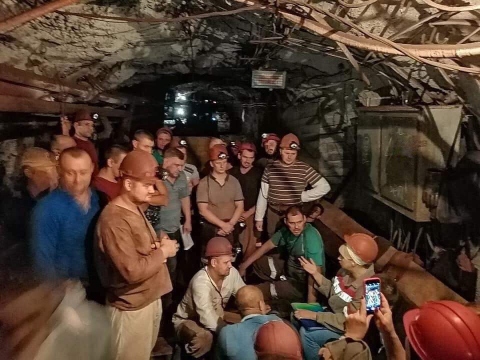Hundreds of mine workers have spent weeks underground in a desperate attempt to win concessions from their employers in Ukraine.
The protests began on 3 September at the Oktyabrskaya mine, where 29 miners started the action.
There was no response from management, so the strike began to spread.
Within a few days, 214 miners at the Rodina mine, 90 miners at the Gvardeyskaya mine and 60 miners at the Ternovskaya mine joined the protest underground.
By mid-September, nearly 400 workers at four mines belonging to the Kryvyi Rih Iron Ore Plant were participating in the protests.
Above ground, the miners are being supported as hundreds of local miners and members of their communities held daily demonstrations.
The miners’ demands include a wage increase, improved working conditions, better pensions and enforcement of health and safety regulations. They are also demanding that the mines’ management, which is widely seen as corrupt, is dismissed.
Unlike most workplace occupations, an underground protest of this kind comes with serious risks to the health and safety of the workers involved. The protesting miners have been exposed to harsh conditions, with high levels of humidity and spreading fungus. They have reported negative effects on their lungs and skin.
At the start, the general director of the company spoke to the protesters in the streets and even descended into the Oktyabrskaya mine to talk to the underground protesters for ninety minutes. But there has been no dialogue since then.
The chairman of the Independent Trade Union of Miners of Ukraine (NPGU), Mykhailo Volynets, is calling on management to engage in social dialogue as soon as possible, but so far with little effect.
Volynets reported that management has increased the pressure on the miners, including attempts of some members of parliament to encourage the workers to change the leadership of their trade unions. “It seems that they want to take control of trade union organizations,” he said. This would be “in violation of international labour standards and national laws.”
There has been some progress. There are rumours that some of the mine managers, those accused of corruption, have been dismissed.
The mine workers are keen to get international support.
Some of them recorded an appeal to members of the European Parliament asking for help to protect their rights, and to protect protesters’ families from persecution.
The global union federation representing mine workers, IndustriALL, is giving the union its full support.
Kemal Özkan, IndustriALL’s assistant general secretary, supported the miners’ demands. “We call on state authorities to pay all wage arrears to coal miners,” he said, “and the Kryvyi Rih Iron Ore Plant management to engage in a social dialogue with unions to resolve the critical situation as soon as possible and avoid the dangerous underground protests in the future.”
The Independent Trade Union of Miners of Ukraine and IndustriALL have just launched a major new online campaign on LabourStart where people can express their solidarity and demand justice for the miners.
It can be found at https://www.labourstart.org/go/miners
This article appears in the current issue of Solidarity.
